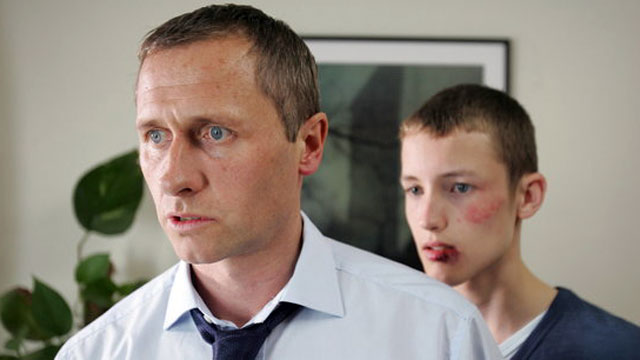WASP
SOFT
Soft and Wasp are two British short films, each famous in their own right with their particular micro-features, camera angles and themes. While both films have family related context they carry different genres and other connotations; Soft having more of a drama genre and Wasp being more or a sort of romantic indie drama mix, both involving what could be thought of as adult themes in Soft (violence/abuse, class issues) and Wasp, (love/lust, child neglect, class issues) .
Soft for example uses the male stereotype that they're not allowed to be feminine and they're refusing to admit their fear as a weakness instead of the expected action it's usually displayed s within film, this allows his son to take on the mantle of man of the house as he figuratively steps up and defends his home after repeatedly asking his father if he was scared; a clear sign of him not only mocking him but showing the audience he's already recognised his fathers fear and will overcome it. It's as if it shows the typical transition of boy to man without even having o detail it in the script, simply by performance alone which is best acted by Micheal Socha (Misfits-E4) who plays the thug. He clearly displays how abuse can affect even those who appear to be the most well put together.
In contrast to Wasp which details a struggling lower class family with a mother who clearly isn't coping but evidently does love her children, it brings up the social issue of having children too young and questions what it means to be a good mother. Her youth is stated but shown in her performance as she speaks to her children as if they were friends not the more disciplined maternal relationship that is socially thought of as acceptable. The mother seeks out a father figure and provider for her children as well as romance for herself but the film has a sort of karma aspect as she tries to hide her children from her date only for him to discover then in an embarrassing situation. However despite this and over dark aspects of the film, it has a relatively optimistic ending with the mother and her kids leaving with her date after he buys them chips; a previous desire stated by the children earlier on in the play which is meant to be a metaphor for him making their dreams come to true, further relating to the optimistic ending as this further highlights this theme t audiences, leaving the film on a nice note.
Analysing their camera angles; Soft begins with a fight with what appears to be a low quality phone camera on a distorted angle, cluing the audience in that it is most likely another teenager they're currently using the POV of to view the scene. This use of mise en scene carries on and switches to a suburban road from a birds eye view POV on what appears to be a fairly normal English day, or at least his is what is portrayed to the audience, from the change in camera and mood it is a clear indicator that not only has the POV matured there has a been an increase in wealth as the camera quality has improved; suggesting a lower class/upper class divide. This is all followed by birds chirping in the background of the film without any being visible which creates an immediate feel of suspense. This suspenseful feel isn't resolved until the car alarm in the film starts ringing, turning the mood frightful and frantic as the characters struggle with their conclusion this is relayed back to the audience with this sound effect.
Wasp opens with a sort of shaky cam effect symbolising the mothers instability with her life and her family situation, this is also further exaggerated as the opening scene is a fight between two struggling families over what seems like completely ridiculous argument is actually a fairly accurate representation of reality. They grey bleak lighting from when they enter their home shows that they're not truly happy in their environment. Grey is a brilliant colour too use as not full being black it doesn't represent darkness but just one of the bleaker stages of life.
Both films display family from different points but both are ultimately about the overall care of children, how we treat them and the affects parents share on their lives with their children's. It questions the basis on whether or not a good parent or the right parent is an achievable goal and ultimately both decide it's not as perfection is not attainable so they highlight the key flaws in human nature so we can recognise them within.






This is again wonderful analysis Rebecca N, if only you could make it into more classes and share this insight with your peers. This would enrich the experience for everyone.
ReplyDeleteGoing forward to enhance this work please consider discussing the production context and the opportunities derived from the success of both these films for the key creatives involved.